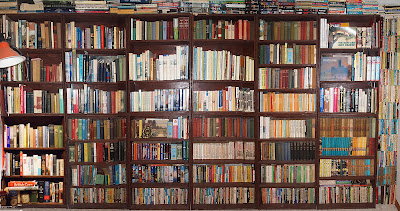 |
| I have plenty of old books to choose from |
Last week I picked up two books by an author that a blogger had highly recommended. From their titles they sounded right up my alley, and both were available as ebooks from the library. Cutting to the chase, I was disappointed in them. I got to thinking about what it was that didn't click with me.
The actual reviews will be posted in a month or so, so rather than spoil those, I'll keep the books nameless and talk in generalities, which is really what my complaints are all about.
Both books sounded like the small stories type of books that I like. Think of D E Stevenson and Molly Clavering, and both were set in England, which is why I picked them up, more or less sight unseen. Now, at least part of my disappointment can be written off to not being the target audience for the stories. Still, the same could be said for either Stevenson or Clavering's books as well, and I like most of their books. Instead, I think it comes down to modern writing vs last century writing.
Broadly speaking, I think that one characteristic of modern is its wordiness. I think this is due to the ease of writing words on a computer which is so much easier and faster than pounding words out (and correcting typos) on a typewriter. That is very clear to me, having written a novel and a novella on a manual typewriter. Of course there were long novels written both by hand and with a typewriter before computers, but it's an order of magnitude easier and faster to do so with a computer. And for that matter its far easier and faster to typeset it at the publisher making long novels more acceptable.
So to return to the two books in question. The first book clocked in at over 500 pages. This for a small story (little saga?) that covers the events of a single year. The second novel came in a 380 plus pages, which is pretty typical these days. Both books, however, seemed too long, too slow and used too many words for the story in hand - for my taste. We're just talking about my tastes here. Both were best selling books, so, as usual, what do I know?
Now I would've said that I like to be immersed in long novels, and maybe I did, once. But these days, I may no longer have the patience I once had, and that could be a factor in my dislike of modern work. Still, if it is written the way I like stories, their length would probably not have been an issue, though at 500 pages it would've had to have been a true saga, not a little story. What all these words allow the author to do is to delve into the trivia of a scene and every thought of the characters at a level not usually found in most of the earlier genre fiction. I find that modern writing that tells me things I don't care to know about. I like well rounded characters, so complaining about too much character seems rather ingenious, but I guess it comes down to the fact that I don't need or want to know every thought that runs through a character's mind. I don't need all elaborate details of the settings - since in my case - I can't picture them in my mind anyway. All these words tend to bog the story down, making it seem like the story-train is never going to arrive at the station.
It seems to me that the way authors wrote - especially English authors in the first half of the 20th century - often achieve the balance of characters that I could get to know and plots that I could follow without getting into the weeds and ditches. That and of did so with bright, clever writing.
My taste in reading is what informs my own writing. I try to write interesting characters, but I don't delve deeply into the mind of even my first person narrator. I write it like he would tell the story, saying only what he would want to share. And since I can't really picture scenes, I try to invent a few key descriptive elements to set a mood, and leave it at that. The same goes for all my characters. I don't really picture them in my mind, I merely sketch in a few features of each, and leave it to the reader to picture them as they will. The result is that I think I write stories that come off as old-fashioned. I hope so anyway.



No comments:
Post a Comment